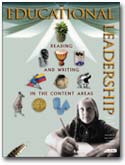SmartBrief Celebrates Its Second Anniversary
ASCD SmartBrief began its third year of publication this fall. SmartBrief provides summaries and links to education stories on curriculum, professional development, leadership, emerging technologies, policy, and other education news to more than 50,000 subscribers. Educators can sign up to receive SmartBrief at no cost by visiting www.smartbrief.com/ascd.
Influence Grants for ASCD Affiliates
ASCD has awarded 14 affiliates Influence Grants for the 2002–2003 school year. The Influence Grant program, now in its third year, helps affiliates implement initiatives that will increase the affiliates' impact on education policy.
Through this program, affiliates will convene summits and state conferences, implement training programs, increase their Internet presence, partner with state Learning First Alliance programs, and form new alliances with other state organizations to influence state policy.
For more information about the Influence Grant program and about this year's grants, contact Constituent Relations at (703) 575-8519.
National Schools of Character Awards
Have you seen positive results from integrating character education into your curriculum, extracurricular activities, and school culture? Do you implement a character education practice that is a model for others? The Character Education Partnership invites you to apply for a National Schools of Character award or a Promising Practices citation. The Character Education Partnership is a nonpartisan coalition of individuals and organizations, including ASCD, dedicated to developing moral character and civic virtue in youth. Its Character Education Quality Standards scoring instrument is an excellent self-assessment tool to help you evaluate your program. The application deadline is Dec. 9, 2002. Visit www.character.orgfor more information.
Sharing ASCD Materials
Many professors who assign ASCD publications in their classes and educators who want to share ASCD materials with their colleagues have asked us how they can make copies without violating copyright law. ASCD also receives frequent requests to reprint and translate its materials. We are delighted that readers want to share these materials; here's how to respect intellectual property rights in the process.
- Educational Leadership: ASCD members may make up to 50 copies of up to three articles from one issue of Educational Leadership. Readers may also purchase individual copies of the magazine for $6 each through ASCD's Service Center; (703) 578-9600 or (800) 933-2723, then press 2.
- Newsletters: ASCD members may make up to 100 copies of a single article from any single ASCD newsletter.
- Journal of Curriculum and Supervision: Educators may make 50 copies of one article from one issue.
For permission to make additional copies or to duplicate content from ASCD books or other publications, please contact the Copyright Clearance Center, 222 Rosewood Dr., Danvers, MA 01923; (978) 750-8400 or (800) 982-3887, ext. 2862; fax: (978) 750-4470; www.copyright.com. The charge for permission is 10 cents per page plus an administrative charge.
Reprinting materials. Reprinting materials means republishing it in another publication, generally for wide distribution—beyond the classroom or school—and often for payment.
To reprint all or part of an ASCD publication, complete the “Request for Permission” form at www.ascd.org/permissions.htmland mail or fax it to Christine Richards, Permissions Coordinator, ASCD, 1703 N. Beauregard St., Alexandria, VA 22311; fax: (703) 575-5403;crichard@ascd.org.
Translating materials. To translate an ASCD book or video into another language, please contact ASCD's foreign rights manager, John DeSimon, 299 W. 12th St., Ste. 16H, New York, NY 10014; (646) 638-4574; fax: (646) 638-4575;JohnDeS114@aol.com. John DeSimon is authorized to negotiate terms of translation agreements on behalf of ASCD.
Content-Area Reading Products and Services
ASCD's new three-tape video series, Reading in the Content Areas, features middle and high school teachers using reading strategies to help their students read for information and retrieve knowledge from textbooks and other materials. These strategies engage students' interest in content, maintain their focus, and improve their understanding and application of what they've read (Stock No. 402029; members, $440; nonmembers, $540; includes an online Facilitator's Guide).
ASCD has also just released the companion piece to this series. This new video program, Implementing a Reading Program in Secondary Schools, shows how teachers and administrators in the schools featured in the series developed their reading programs in a three-phase process of planning, implementing, and reviewing the effectiveness of the program. Viewers can see how reading programs developed by an inner-city high school, a suburban high school, and an urban middle school enhance student achievement in reading and in the content areas (Stock No. 402033; members, $195; nonmembers, $234; includes one tape and a Facilitator's Guide).
The book Teaching Reading in the Content Areas: If Not Me, Then Who?, by Rachel Billmeyer and Mary Lee Barton (Stock No. 397258; members and nonmembers, $27.95), has two supplements: Teaching Reading in Mathematics, 2nd Edition, by Mary Lee Barton and Clare Heidema (Stock No. 302053; members, $20.95; nonmembers, $22.95), and Teaching Reading in Science, by Mary Lee Barton and Deborah L. Jordan (Stock No. 302269; members, $20.95; nonmembers, $22.95). Emily F. Calhoun's Teaching Beginning Reading and Writing with the Picture Word Inductive Model is also available (Stock No. 199025; members, $13.95; nonmembers, $16.95).
Starting later this month, ASCD will offer a new professional development online (PD Online) course, Successful Strategies for Literacy and Learning, on how teachers can help students improve subject-area learning and reading comprehension skills. For more information, visithttp://pdonline.ascd.org.
ASCD Forum Series
ASCD presents the first in a series of forums aimed at fostering dialogue among policymakers, the media, and the education community on complex issues in education policy and practice. Meeting on Nov. 13, 2002, at the Smithsonian Institution's S. Dillon Ripley Center, participants in the first forum will discuss current issues in environmental education. ASCD has been working with the Environmental Education and Training Partnership, the National Environmental Education and Training Foundation, the Smithsonian Center for Education and Museum Studies, and the U.S. Environmental Protection Agency to prepare for the event.
Future forums will deal with such topics as teacher quality; communication between educators and the media; educating for democratic citizenship; issues related to the call for scientifically based research; and living with and educating about our deepest differences. For information about the forum series, visit the “News and Issues” section ofwww.ascd.org, or contact Don Ernst, dernst@ascd.org.

